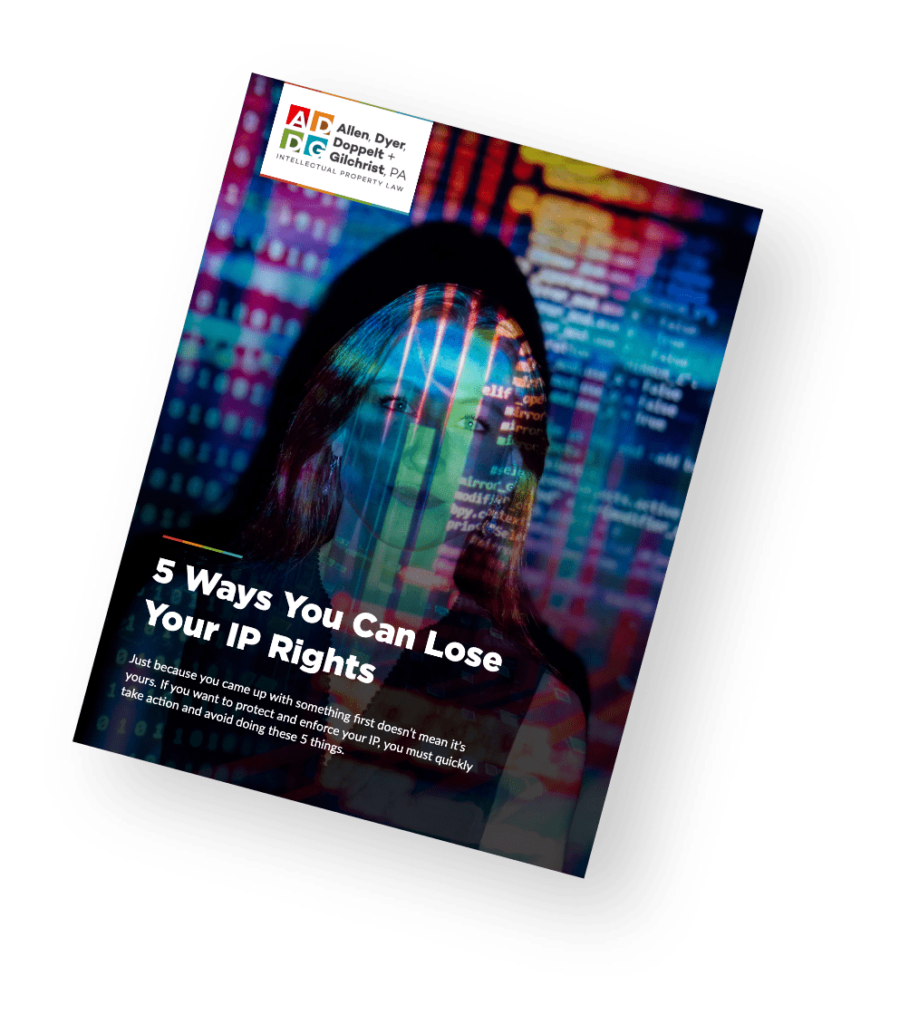
First, a short true-false quiz about copyrights!
True or false?
- I paid a freelance photographer to take photos for my website. I own them.
- I copied music for my church choir for church services. No permission is needed.
- My employee wrote code for an app as part of her job at my company. When she leaves the company she can take the code with her.
- I downloaded an image from Google Images for my website, and gave credit to the photographer. I don’t need permission.
- I picked up a floor plan at a model house, and gave the plan to another builder to create blueprints build the house. As long as I mention where I get it I’m OK.
We’ve included the answers at the end of this post. Now, let’s dive into 12 things you should know about copyrights.
1. What is Copyright?
A copyright is a bundle of legal rights the copyright owner has in an original work fixed in a tangible form of expression. Included are the rights to:
- Reproduce the work – make copies
- Perform the work publicly
- Exhibit the work
- Distribute copies of the work
- Make derivative works, e.g., translations, movies based on the work, condensations, audio books, graphic novels based on the work
The purchaser of a physical work (a painting, a book) does not automatically own the copyright in that work.
What Types of Things Can Be Copyrighted?
- Literary and artistic works
- Photographs
- Musical works (music and lyrics)
- Dramatic works
- Audio and video recordings and films
- Architectural works
- Software
- Print or electronic content (both words and images)
What Does NOT Qualify for Copyright?
- Ideas
- Facts, research, methods, concepts, plots
- Works of the federal government
- Works in the public domain
- Functional devices
- Works of insufficient creativity to qualify, e.g., simple shapes, patterns, short phrases
- Titles of books, songs or movies
2. What Do You Have to Do to Copyright Your Work?
Nothing, believe it or not.
Then What Is Copyright Registration?
Copyright exists automatically as soon as an original work is reduced to a fixed form. Even if there is no copyright notice. Copyright registration in the U.S. Copyright Office (part of the Library of Congress) is required before you can sue in court for copyright infringement.
To register, you must complete the electronic form at www.copyright.gov. It asks who created the work, who owns the copyright, when the work was finished and whether it includes anything owned by someone else. You must also submit a digital copy of the work and pay a filing fee.
The registration process takes several months. During that time, the Copyright Office does not check whether someone else already registered a similar work. If the work is copyrightable, the form is complete and correct, and you submit a copy and pay the fee, the work will receive a copyright registration.
Then Why Bother To Register the Copyright?
As noted, you must have a copyright registration before you can work with an intellectual property law firm to sue for copyright infringement.
And if you register before the infringement, or within 3 months of publication, you have the opportunity to receive money damages without proving how much you lost and to ask that your attorneys’ fees and costs be repaid.
You can wait until after your copyright is infringed before you register, but if you do, you will have to prove how much you actually lost as a result of the infringement, and you won’t qualify for attorneys’ fees and costs.
3. What Does Copyright Registration Cost?
Ultimately, the price of a copyright depends upon the law firm you’re working with. However, we’re happy to provide our pricing for copyright registration.
At Allen, Dyer, Doppelt + Gilchrist, our copyright attorneys will file an application to register your copyright for a fee beginning at $500 plus the government fee of $45 or $65 (depending on the number or type of authors).
4. How Long Does a Copyright Last?
A long time. For works created after 1978, the copyright lasts for the life of the author, plus 70 years. For works published under a false name, or which are owned by a company, the copyright lasts for 95 years from publication or 120 years from creation, whichever is shorter.
For works created before 1978, there are varying durations. You should generally presume that unless a work is older than the mid-1920’s, it’s probably copyrighted.
5. What Does It Mean If a Work Is in the Public Domain?
Public domain works are not protected by copyright. They include works in which the copyright has expired, or works created by the federal government, or works where for some reason the copyright was abandoned or lost (e.g., the owner, under the old law, failed to renew at the end of 28 years).
6. What About Copyright Notice?
There was a time when if you omitted the notice, or got it wrong, you permanently lost your copyright. But since 1989 a copyright notice is no longer required. Still, you should use it on all copyrightable works, whether or not the work is registered. The notice consists of:
© + name of the copyright owner(s) + year the work was first published.
7. Who Owns the Copyright in a Work?
Generally, the creator (artist, writer, songwriter, architect, choreographer, software coder) owns the copyright in the work he or she created.
However, there are exceptions:
- Work for Hire: A salaried employee who creates original works as part of the job never owns that work. It automatically belongs to the employer as a “work for hire.” Think about the animators who are employed by Disney. But this does not apply to independent contractors. The company or person who hires an independent contractor and pays for the work does not own the copyright. The freelancer (or his or her employer) must assign the copyright in writing. Without a written assignment or written work for hire agreement, the rights remain with the freelancer, not the one who paid for it.
- Assignment: The owner of the copyright can permanently sell or transfer all or any of the rights of copyright in a written transfer.
- License: The copyright owner can also lend, or license, all or any of the copyright rights for a limited period of time, or for specific markets. But the original copyright owner remains the owner.
8. Can There Be More Than One Owner of a Copyright?
Yes. If more than one person contributes copyrightable material to a work, and they each intend that it be a single inseparable work, they are co-owners, and the copyright is jointly held. Each owner shares ownership of the entire work, and can use the work without asking the other co-owners.
9. What Are The Rules About Copying Someone Else’s Work?
If a work is copyrighted (and you should assume most works after the 1920’s are), then you need permission to copy all or part of that work.
Remember that giving credit is not permission. Nor is paying money. Ownership of a copyright gives the owner the right to control how the work is used – permission can be granted or denied, limited or unlimited, free or for money.
When don’t you need to permission to copy a copyrighted work?
- If the work is in the public domain.
- If the use is “fair use.” But what is fair use? Fair use allows you to copy a copyrighted work without permission from the copyright owner.
10. How Do You Know if Something is Fair Use?
Unfortunately, only a judge or jury can decide. There are no hard and fast rules establishing when you don’t need permission to copy. There is nothing in the law that says if your use is for a charitable purpose, of if it’s newsworthy, or if you use less than 25%, or fewer than 100 words, then it’s OK.
Instead, copyright law requires that we consider four factors:
- Purpose and character of the use.
- Is it educational, religious, charitable, criticism?
- Is it transformative?
- Nature of the copyrighted work.
- Fact or fiction?
- Published or unpublished?
- Amount and substantiality of portion taken.
- The smaller the amount used, the more likely it will be fair use.
- Depends on the type of work (music? poetry?).
- Can’t take the “heart” of the work.
- Effect on potential market for the copyrighted work.
- Will the sale of the infringing work hurt the copyrighted work?
11. What Is Copyright Infringement?
Copyright infringement is copying a copyrighted work without permission from the copyright owner.
- Need not copy the entire work.
- Need not be verbatim, word-for-word copying; paraphrasing can still be infringement.
- Intent is not required; even innocent copying can be infringement.
- Giving credit is no defense.
- The fact you made no money is no defense.
- Even if you stop (e.g., you take it off your website) you can still be sued for past infringement.
- Fair use may be a good defense if you can prove it.
- It’s also a defense if you can prove that you didn’t copy – by coincidence, you independently created a similar work.
- A plaintiff must prove the defendant copied the copyrighted work. If the owner doesn’t have proof of copying, then it’s enough to show access + substantial similarity.
12. What Can You Do About Copyright Infringement?
If you’re a victim of copyright infringement, the first thing you should do is contact an intellectual property law firm that practices intellectual property litigation and copyright prosecution for guidance.
So the lesson is: assume all modern works are copyrighted, even if there is no copyright notice, and assume you need permission from the copyright owner to copy. It’s up to you to decide how much risk you’re willing to take by not seeking permission.
Answers to the Quiz: Now You Know – ALL are false!
Need Help with Copyright Acquisition or Counseling? We’re Here For You!
If you need help getting something copyrighted or have questions about copyright infringement, call us today! At Allen, Dyer, Doppelt and Gilchrist, our team of copyright lawyers in Florida are available to meet with you in-person at one of our offices in Orlando, Miami, Jacksonville or Winter Springs, or virtually from anywhere in the world.
About the Author
Ava K. Doppelt is a proud shareholder at Allen, Dyper, Doppelt and Gilchrist. Ms. Doppelt is Board-Certified by the Florida Bar in Intellectual Property Law. She manages trademark and copyright portfolios, and has substantial litigation experience in numerous areas including federal and state courts and administrative agencies and advising clients on copyright and trademark matters.

Share This



